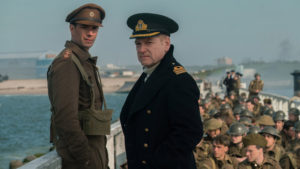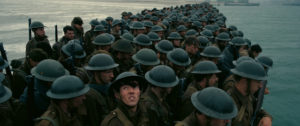There is a quote that goes around attributed to François Truffaut about the incapability of making an anti-war film. This quote was used often by Roger Ebert, but is actually quite difficult to pin down its actual source. Truffaut does speak about making a film about Algiers and deciding against it because he thought “to show something was to ennoble it” (Truffaut: A Biography, 164) and he spoke to Gene Siskel on November 11, 1973 in the Chicago Tribune:
“I find violence is very ambiguous in movies. For example, some films claim to be antiwar, but I don’t think I’ve really seen an antiwar film. Every film about war ends up being pro-war.”
 While I do not think Christopher Nolan set out to make an antiwar film, I think the way he set about framing the narrative of his latest film, Dunkirk, is fascinating when looking at the nature of war films and how they use violence either as critique or as exploitation—and the line between is very fine, almost indecipherable. The audience gets very little individual human story and what individual human story we get is offset against a film that is more interested in how war efforts actually take a community: nations, militaries, citizens. No one is left unaffected by the cloud of conflict.
While I do not think Christopher Nolan set out to make an antiwar film, I think the way he set about framing the narrative of his latest film, Dunkirk, is fascinating when looking at the nature of war films and how they use violence either as critique or as exploitation—and the line between is very fine, almost indecipherable. The audience gets very little individual human story and what individual human story we get is offset against a film that is more interested in how war efforts actually take a community: nations, militaries, citizens. No one is left unaffected by the cloud of conflict.
I think it is a fair observation to say that the film is, to some extent, emotionally detached, because it focuses so intentionally on the group effort that the smaller human stories that the audience is supposed to “relate” to get subsumed by a bigger, more transcendent narrative. This isn’t to say that the individual stories we have aren’t effective (some are, some aren’t), but that the focus is shifted towards a most un-American concept: war is not fought or “won” by individuals, it’s fought and “won” by a complex interplay of people and formal and informal forces. It is harder to get that emotional kick—whether from a moment of sacrifice or the sentimentality of patriotism—from a war film when there is a diversity of people and powers that influence the outcome of any battle.
What we receive then is an immersion into this attempted massacre of British (and French) troops. The sound takes a page from the Spinal Tap book and is turned up to 11. The small amount of dialogue is often hard to hear because of the noises of conflict. I would imagine if we were truly in those spaces, we would actually have a hard time hearing what anyone was saying as well. We are on the concrete jetties with the troops as they load up on the ships and the bombs rain down all around. We are on the water with a civilian boat going to help with getting the troops off the coast. We are in the cockpit of the Spitfires as they follow and shoot down German planes. Dunkirk is as close to a first-person RPG war film as we have had thus far.
 As someone who holds to a form of pacifism, I have often made the case that if one is going to commit violence against another human being, then there needs to be little to no mediation in the act. It needs to be intimate, personal and weigh heavily on the conscious of the one committing the act—i. e. it needs to mess that person up something good. No technology, no drones, nothing that puts space or provides detachment between the perpetrator and the victim. In a sense, Dunkirk could be viewed by the more thoughtful audience members as an opportunity to begin to feel some of that weight. There will never be a one-to-one ratio until the actual safety of the audience in the theater is under threat, but if the audience is willing to be subsumed by the story and be fully immersed, maybe there is something there which will give definition and cost to the violence done during “The Good War.”
As someone who holds to a form of pacifism, I have often made the case that if one is going to commit violence against another human being, then there needs to be little to no mediation in the act. It needs to be intimate, personal and weigh heavily on the conscious of the one committing the act—i. e. it needs to mess that person up something good. No technology, no drones, nothing that puts space or provides detachment between the perpetrator and the victim. In a sense, Dunkirk could be viewed by the more thoughtful audience members as an opportunity to begin to feel some of that weight. There will never be a one-to-one ratio until the actual safety of the audience in the theater is under threat, but if the audience is willing to be subsumed by the story and be fully immersed, maybe there is something there which will give definition and cost to the violence done during “The Good War.”
Maybe we will see, also, that there is an inherent pettiness to an unthoughtful nationalism that believes it can win and survive on its own without help. The film is very British and it is unapologetically from that perspective, but Nolan goes out of his way to show the ways in which the French were important to the efforts in Dunkirk (in large and small ways) and moments where humanity trumped borders.
In the final scenes of the film, we have what I consider to be postscripts to the main drive of the film. Each parallel plot (land, water, air) is given a final word, a final breath. I found these to be subtle and pregnant with meaning in their smallness. A pilot resigned to German capture, a boy’s picture in the paper, hailing “hero,” and a rattled newspaper and a sigh, these are the sights and sounds of war. There is conflict, there is survival, there is resignation, there is grace, and there is the silent sigh of the not yet. Hope and joy and peace are always tempered in this world. Not quite realized, but felt in between the crashing bombs and the human disputes.
 It’s really those quiet moments at the end of Dunkirk that frame the film in all of its loud ferocity. On the surface, the film may appear to be pro-war, nationalistic and ennobling of the violence of this moment in history, but look for the silent moments, they may say something significantly different.
It’s really those quiet moments at the end of Dunkirk that frame the film in all of its loud ferocity. On the surface, the film may appear to be pro-war, nationalistic and ennobling of the violence of this moment in history, but look for the silent moments, they may say something significantly different.



1 comment